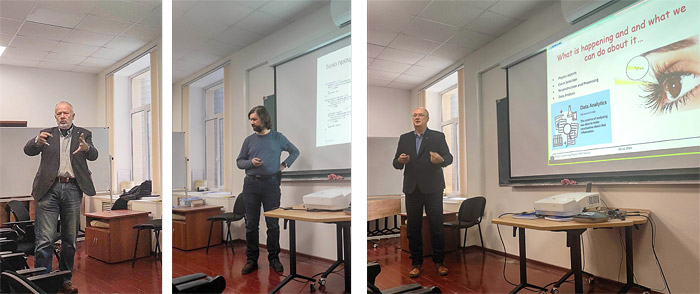
Electronic english version since 2022 |
The newspaper was founded in November 1957
| |
Events
Specifics of working with data in physical experiments
discussed at MIPT
On 2-4 December, the second scientific school-seminar "New techniques of processing data from physical experiments" was held in the hybrid format at the Moscow Institute of Physics and Technology (MIPT). The goal of the event was to unite the efforts of different experimental groups in developing new concepts for processing large volumes of data. Organizers: MIPT and JINR.
The exponential increase of data volumes in fundamental physics experiments is a serious challenge for modern science. In this regard, the use of new effective approaches to the issues of interpretation and physical analysis becomes increasingly relevant. Machine learning and other advanced technologies gradually become critical tools for overcoming these obstacles and achieving breakthrough results.
On the first day of the School, reports were presented covering key aspects of the development of computational technologies in high energy physics. The event was opened by Director of the Laboratory of Information Technologies Sergey Shmatov that welcomed the participants on behalf of the Joint Institute and gave a lecture on why physicists need to understand computational methods and data processing techniques using the example of experiments at the Large Hadron Collider at CERN. He also spoke about the plans of MLIT to organize data accumulation and storage systems for the Mega Science project NICA, implemented at JINR.

The first day's programme preceded with a report by junior researcher Evgeny Kurbatov at the HSE Laboratory of Methods for Big Data Analysis (LAMBDA), on examples of applying machine learning techniques to some data selection and classification tasks in the BM@N and SPD experiments. Director of the Centre for Scientific Programming at MIPT Alexander Nozik touched upon current issues related to organizing work with data and proposed practical solutions for accelerating analysis and reducing the time spent debugging work programmes.
On 3 December, LAMBDA leading researcher Fedor Ratnikov presented a report on general approaches to using generative neural networks to meet data processing issues in high energy physics. Junior researcher at the International Laboratory of Elementary Particle Physics at the National Research University Higher School of Economics Murad Yasaveev spoke about the use of an algorithm for searching for B-meson decays based on ultra-precise neural networks. A heated discussion was sparked by the report of researcher at the Laboratory of Big Data Processing in Particle Physics and Astrophysics at the INR RAS Ivan Haruk on the description of data on extensive air showers in the Telescope Array experiment and neutrino events at the Baikal-GVD facility. The scientific programme of the second day was concluded by a report by senior researcher at MLIT Martin Bures on the use of quantum algorithms in reconstructing events in collider experiments.
On the last day of the seminar, several reports on the application of machine learning-based algorithms in the tasks of calculating magnetic fields at accelerators, as well as in the tasks of maintaining the required parameters of an accelerated particle beam were presented.
"An important part of the event was the daily final sessions dedicated to general discussions and the discussion of the reports presented during the day," one of the organizers of the school-seminar, senior researcher at VBLHEP Alexey Aparin said. "Their participants could keep communicating in a less formal setting on issues of interest to them, discussed in the lectures. It is worth noting that many of the speakers are young scientists that creates the friendliest atmosphere for the discussion. In this way, we hope to increase students' interest in working in mega-science experiments and attract even more young people to physics."
More than 80 specialists, postgraduates and students from leading Russian scientific and educational organizations, including JINR, MIPT, HSE, INR RAS and St. Petersburg State University, took part in the school-seminar "New techniques of processing data from physical experiments". The event became a unique platform for active cooperation and exchange of experience between scientists and young specialists in the field of working with data.
Based on the information from the JINR Press Office